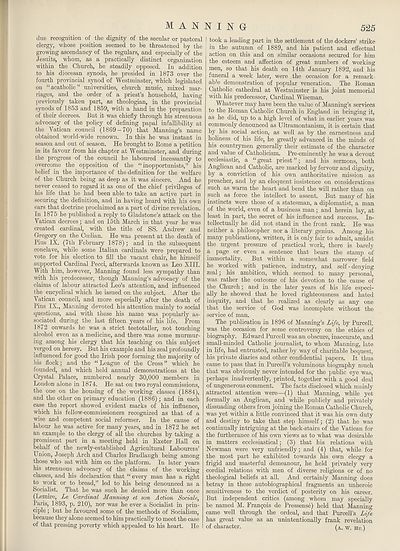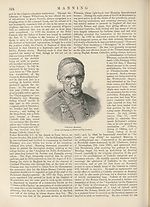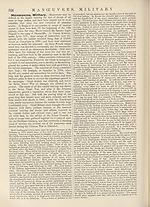New volumes of the Encyclopædia Britannica > Volume 30, K-MOR
(557) Page 525
Download files
Complete book:
Individual page:
Thumbnail gallery: Grid view | List view

MANNING
due recognition of the dignity of the secular or pastoral
clergy, whose position seemed to be threatened by the
growing ascendancy of the regulars, and especially of the
Jesuits, whom, as a practically distinct organization
within the Church, he steadily opposed. In addition
to his diocesan synods, he presided in 1873 over the
fourth provincial synod of Westminster, which legislated
on “acatholic” universities, church music, mixed mar¬
riages, and the order of a priest’s household, having
previously taken part, as theologian, in the provincial
synods of 1853 and 1859, witli a hand in the preparation
of their decrees. But it was chiefly through his strenuous
advocacy of the policy of defining papal infallibility at
the Vatican council (1869-70) that Manning’s name
obtained world-wide renown. In this he was instant in
season and out of season. He brought to Rome a petition
in its favour from his chapter at Westminster, and during
the progress of the council he laboured incessantly to
overcome the opposition of the “inopportunists,” his
belief in the importance of the definition for the welfare
of the Church being as deep as it was sincere. And he
never ceased to regard it as one of the chief privileges of
his life that he had been able to take an active part in
securing the definition, and in having heard with his own
ears that doctrine proclaimed as a part of divine revelation.
In 1875 he published a reply to Gladstone’s attack on the
Vatican decrees; and on 15th March in that year he was
created cardinal, with the title of SS. Andrew and
Gregory on the Coelian. He was present at the death of
Pius IX. (7th February 1878); and in the subsequent
conclave, while some Italian cardinals were prepared to
vote for his election to fill the vacant chair, he himself
supported Cardinal Pecci, afterwards known as Leo XIII.
With him, however, Manning found less sympathy than
with his predecessor, though Manning’s advocacy of the
claims of labour attracted Leo’s attention, and influenced
the encyclical which he issued on the subject. After the
Vatican council, and more especially after the death of
Pius IX., Manning devoted his attention mainly to social
questions, and with these his name wras popularly as¬
sociated during the last fifteen years of his life. From
1872 onwards he was a strict teetotaller, not touching
alcohol even as a medicine, and there was some murmur¬
ing among his clergy that his teaching on this subject
verged on heresy. But his example and his zeal profoundly
influenced for good the Irish poor forming the majority of
his flock; and the “ League of the Cross ” which he
founded, and winch held annual demonstrations at the
Crystal Palace, numbered nearly 30,000 members in
London alone in 1874. He sat on two royal commissions,
the one on the housing of the working classes (1884),
and the other on primary education (1886); and in each
case the report showed evident marks of his influence,
which his fellow-commissioners recognized as that of a
wise and competent social reformer. In the cause of
labour he was active for many years, and in 1872 he set
an example to the clergy of all the churches by taking a
prominent part in a meeting held in Exeter Hall on
behalf of the newly-established Agricultural Labourers’
Union, Joseph Arch and Charles Bradlaugh being among
those who sat with him on the platform. In later years
his strenuous advocacy of the claims of the working
classes, and his declaration that “ every man has a right
to work or to bread,” led to his being denounced as a
Socialist. That he was such he denied more than once
(Lemire, Ze Cardinal Manning et son Action Sociale,
Paris, 1893, p. 210), nor was he ever a Socialist in prin¬
ciple ; but he favoured some of the methods of Socialism,
because they alone seemed to him practically to meet the case
of that pressing poverty which appealed to his heart. He
525
' took a leading part in the settlement of the dockers’ strike
in the autumn of 1889, and his patient and effectual
action on this and on similar occasions secured for him
the esteem and affection of great numbers of working
men, so that his death on 14th January 1892, and his
funeral a week later, were the occasion for a remark
aWe demonstration of popular veneration. The Roman
Catholic cathedral at Westminster is his joint memorial
with his predecessor, Cardinal Wiseman.
Whatever may have been the value of Manning’s services
to the Roman Catholic Church in England in bringing it,
as he did, up to a high level of what in earlier years was
commonly denounced as Ultramontanism, it is certain that
by his social action, as well as by the earnestness and
holiness of his life, he greatly advanced in the minds of
his countrymen generally their estimate of the character
and value of Catholicism. Pre-eminently he was a devout
ecclesiastic, a “great priest”; and his sermons, both
Anglican and Catholic, are marked by fervour and dignity,
by a conviction of his own authoritative mission as
preacher, and by an eloquent insistence on considerations
such as warm the heart and bend the will rather than on
such as force the intellect to assent. But many of his
instincts were those of a statesman, a diplomatist, a man
of the world, even of a business man; and herein lay, at
least in part, the secret of his influence and success. In¬
tellectually he did not stand in the front rank. He was
neither a philosopher nor a literary genius. Among his
many publications, written, it is only fair to admit, amidst
the urgent pressure of practical work, there is barely
a page or even a sentence that bears the stamp of
immortality. But within a somewhat narrower field
he worked with patience, industry, and self-denying
zeal; his ambition, which seemed to many personal,
was rather the outcome of his devotion to the cause of
the Church; and in the later years of his life especi¬
ally he showed that he loved righteousness and hated
iniquity, and that he realized as clearly as any one
that the service of God was incomplete without the
service of man.
The publication in 1896 of Manning’s Life, by Purcell,
was the occasion for some controversy on the ethics of
biography. Edward Purcell was an obscure, inaccurate, and
small-minded Catholic journalist, to whom Manning, late
in life, had entrusted, rather by way of charitable bequest,
his private diaries and other confidential papers. It thus
came to pass that in Purcell’s voluminous biography much
that was obviously never intended for the public eye was,
perhaps inadvertently, printed, together with a good deal
of ungenerous comment. The facts disclosed which mainly
attracted attention were—(1) that Manning, while yet
formally an Anglican, and while publicly and privately
dissuading others from joining the Roman Catholic Church,
was yet within a little convinced that it was his own duty
and destiny to take that step himself; (2) that he was
continually intriguing at the back-stairs of the Vatican for
the furtherance of his own views as to what was desirable
in matters ecclesiastical; (3) that his relations with
Newman were very unfriendly; and (4) that, while for
the most part he exhibited towards his own clergy a
frigid and masterful demeanour, he held privately very
cordial relations with men of diverse religions or of no
theological beliefs at all. And certainly Manning does
betray in these autobiographical fragments an unheroic
sensitiveness to the verdict of posterity on his career.
But independent critics (among whom may specially
be named M. Frangois de Pressense) held that Manning
came well through the ordeal, and that Purcell’s Life
has great value as an unintentionally frank revelation
of character. (A- w Hu)
due recognition of the dignity of the secular or pastoral
clergy, whose position seemed to be threatened by the
growing ascendancy of the regulars, and especially of the
Jesuits, whom, as a practically distinct organization
within the Church, he steadily opposed. In addition
to his diocesan synods, he presided in 1873 over the
fourth provincial synod of Westminster, which legislated
on “acatholic” universities, church music, mixed mar¬
riages, and the order of a priest’s household, having
previously taken part, as theologian, in the provincial
synods of 1853 and 1859, witli a hand in the preparation
of their decrees. But it was chiefly through his strenuous
advocacy of the policy of defining papal infallibility at
the Vatican council (1869-70) that Manning’s name
obtained world-wide renown. In this he was instant in
season and out of season. He brought to Rome a petition
in its favour from his chapter at Westminster, and during
the progress of the council he laboured incessantly to
overcome the opposition of the “inopportunists,” his
belief in the importance of the definition for the welfare
of the Church being as deep as it was sincere. And he
never ceased to regard it as one of the chief privileges of
his life that he had been able to take an active part in
securing the definition, and in having heard with his own
ears that doctrine proclaimed as a part of divine revelation.
In 1875 he published a reply to Gladstone’s attack on the
Vatican decrees; and on 15th March in that year he was
created cardinal, with the title of SS. Andrew and
Gregory on the Coelian. He was present at the death of
Pius IX. (7th February 1878); and in the subsequent
conclave, while some Italian cardinals were prepared to
vote for his election to fill the vacant chair, he himself
supported Cardinal Pecci, afterwards known as Leo XIII.
With him, however, Manning found less sympathy than
with his predecessor, though Manning’s advocacy of the
claims of labour attracted Leo’s attention, and influenced
the encyclical which he issued on the subject. After the
Vatican council, and more especially after the death of
Pius IX., Manning devoted his attention mainly to social
questions, and with these his name wras popularly as¬
sociated during the last fifteen years of his life. From
1872 onwards he was a strict teetotaller, not touching
alcohol even as a medicine, and there was some murmur¬
ing among his clergy that his teaching on this subject
verged on heresy. But his example and his zeal profoundly
influenced for good the Irish poor forming the majority of
his flock; and the “ League of the Cross ” which he
founded, and winch held annual demonstrations at the
Crystal Palace, numbered nearly 30,000 members in
London alone in 1874. He sat on two royal commissions,
the one on the housing of the working classes (1884),
and the other on primary education (1886); and in each
case the report showed evident marks of his influence,
which his fellow-commissioners recognized as that of a
wise and competent social reformer. In the cause of
labour he was active for many years, and in 1872 he set
an example to the clergy of all the churches by taking a
prominent part in a meeting held in Exeter Hall on
behalf of the newly-established Agricultural Labourers’
Union, Joseph Arch and Charles Bradlaugh being among
those who sat with him on the platform. In later years
his strenuous advocacy of the claims of the working
classes, and his declaration that “ every man has a right
to work or to bread,” led to his being denounced as a
Socialist. That he was such he denied more than once
(Lemire, Ze Cardinal Manning et son Action Sociale,
Paris, 1893, p. 210), nor was he ever a Socialist in prin¬
ciple ; but he favoured some of the methods of Socialism,
because they alone seemed to him practically to meet the case
of that pressing poverty which appealed to his heart. He
525
' took a leading part in the settlement of the dockers’ strike
in the autumn of 1889, and his patient and effectual
action on this and on similar occasions secured for him
the esteem and affection of great numbers of working
men, so that his death on 14th January 1892, and his
funeral a week later, were the occasion for a remark
aWe demonstration of popular veneration. The Roman
Catholic cathedral at Westminster is his joint memorial
with his predecessor, Cardinal Wiseman.
Whatever may have been the value of Manning’s services
to the Roman Catholic Church in England in bringing it,
as he did, up to a high level of what in earlier years was
commonly denounced as Ultramontanism, it is certain that
by his social action, as well as by the earnestness and
holiness of his life, he greatly advanced in the minds of
his countrymen generally their estimate of the character
and value of Catholicism. Pre-eminently he was a devout
ecclesiastic, a “great priest”; and his sermons, both
Anglican and Catholic, are marked by fervour and dignity,
by a conviction of his own authoritative mission as
preacher, and by an eloquent insistence on considerations
such as warm the heart and bend the will rather than on
such as force the intellect to assent. But many of his
instincts were those of a statesman, a diplomatist, a man
of the world, even of a business man; and herein lay, at
least in part, the secret of his influence and success. In¬
tellectually he did not stand in the front rank. He was
neither a philosopher nor a literary genius. Among his
many publications, written, it is only fair to admit, amidst
the urgent pressure of practical work, there is barely
a page or even a sentence that bears the stamp of
immortality. But within a somewhat narrower field
he worked with patience, industry, and self-denying
zeal; his ambition, which seemed to many personal,
was rather the outcome of his devotion to the cause of
the Church; and in the later years of his life especi¬
ally he showed that he loved righteousness and hated
iniquity, and that he realized as clearly as any one
that the service of God was incomplete without the
service of man.
The publication in 1896 of Manning’s Life, by Purcell,
was the occasion for some controversy on the ethics of
biography. Edward Purcell was an obscure, inaccurate, and
small-minded Catholic journalist, to whom Manning, late
in life, had entrusted, rather by way of charitable bequest,
his private diaries and other confidential papers. It thus
came to pass that in Purcell’s voluminous biography much
that was obviously never intended for the public eye was,
perhaps inadvertently, printed, together with a good deal
of ungenerous comment. The facts disclosed which mainly
attracted attention were—(1) that Manning, while yet
formally an Anglican, and while publicly and privately
dissuading others from joining the Roman Catholic Church,
was yet within a little convinced that it was his own duty
and destiny to take that step himself; (2) that he was
continually intriguing at the back-stairs of the Vatican for
the furtherance of his own views as to what was desirable
in matters ecclesiastical; (3) that his relations with
Newman were very unfriendly; and (4) that, while for
the most part he exhibited towards his own clergy a
frigid and masterful demeanour, he held privately very
cordial relations with men of diverse religions or of no
theological beliefs at all. And certainly Manning does
betray in these autobiographical fragments an unheroic
sensitiveness to the verdict of posterity on his career.
But independent critics (among whom may specially
be named M. Frangois de Pressense) held that Manning
came well through the ordeal, and that Purcell’s Life
has great value as an unintentionally frank revelation
of character. (A- w Hu)
Set display mode to:
![]() Universal Viewer |
Universal Viewer | ![]() Mirador |
Large image | Transcription
Mirador |
Large image | Transcription
Images and transcriptions on this page, including medium image downloads, may be used under the Creative Commons Attribution 4.0 International Licence unless otherwise stated. ![]()
| Encyclopaedia Britannica > New volumes of the Encyclopædia Britannica > Volume 30, K-MOR > (557) Page 525 |
|---|
| Permanent URL | https://digital.nls.uk/193574742 |
|---|
| Attribution and copyright: |
|
|---|---|
| Shelfmark | EB.18 |
|---|---|
| Description | Ten editions of 'Encyclopaedia Britannica', issued from 1768-1903, in 231 volumes. Originally issued in 100 weekly parts (3 volumes) between 1768 and 1771 by publishers: Colin Macfarquhar and Andrew Bell (Edinburgh); editor: William Smellie: engraver: Andrew Bell. Expanded editions in the 19th century featured more volumes and contributions from leading experts in their fields. Managed and published in Edinburgh up to the 9th edition (25 volumes, from 1875-1889); the 10th edition (1902-1903) re-issued the 9th edition, with 11 supplementary volumes. |
|---|---|
| Additional NLS resources: |
|

